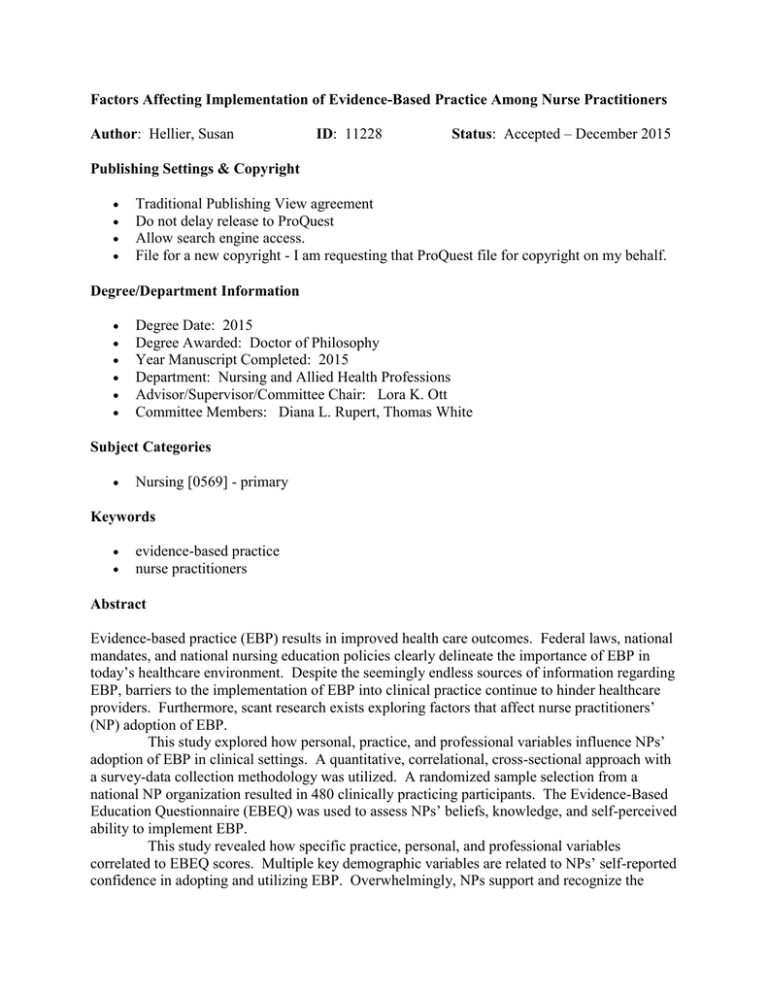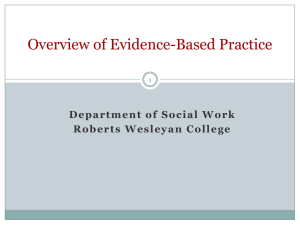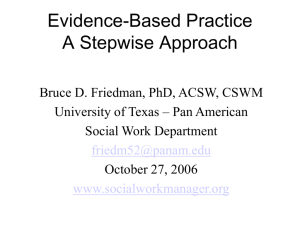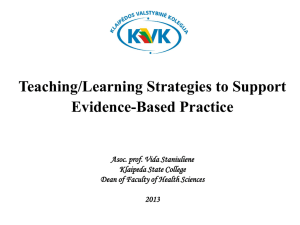Factors Affecting Implementation of Evidence-Based Practice Among Nurse Practitioners Author ID Status
advertisement

Factors Affecting Implementation of Evidence-Based Practice Among Nurse Practitioners Author: Hellier, Susan ID: 11228 Status: Accepted – December 2015 Publishing Settings & Copyright Traditional Publishing View agreement Do not delay release to ProQuest Allow search engine access. File for a new copyright - I am requesting that ProQuest file for copyright on my behalf. Degree/Department Information Degree Date: 2015 Degree Awarded: Doctor of Philosophy Year Manuscript Completed: 2015 Department: Nursing and Allied Health Professions Advisor/Supervisor/Committee Chair: Lora K. Ott Committee Members: Diana L. Rupert, Thomas White Subject Categories Nursing [0569] - primary Keywords evidence-based practice nurse practitioners Abstract Evidence-based practice (EBP) results in improved health care outcomes. Federal laws, national mandates, and national nursing education policies clearly delineate the importance of EBP in today’s healthcare environment. Despite the seemingly endless sources of information regarding EBP, barriers to the implementation of EBP into clinical practice continue to hinder healthcare providers. Furthermore, scant research exists exploring factors that affect nurse practitioners’ (NP) adoption of EBP. This study explored how personal, practice, and professional variables influence NPs’ adoption of EBP in clinical settings. A quantitative, correlational, cross-sectional approach with a survey-data collection methodology was utilized. A randomized sample selection from a national NP organization resulted in 480 clinically practicing participants. The Evidence-Based Education Questionnaire (EBEQ) was used to assess NPs’ beliefs, knowledge, and self-perceived ability to implement EBP. This study revealed how specific practice, personal, and professional variables correlated to EBEQ scores. Multiple key demographic variables are related to NPs’ self-reported confidence in adopting and utilizing EBP. Overwhelmingly, NPs support and recognize the value of EBP; however, the study revealed discrepancies in implementation. Many NPs reported sources of clinical information that are clearly not evidence-based, such as use of intuition to make clinical practice decisions. Finally, the data revealed NPs’ self-reported facilitating factors and barriers to EBP. Results of this study indicated that the DNP education transforms NPs’ self-reported adoption and utilization of EBP; whereas, other practice, personal, and professional variables have less influence in EBP. Encouragingly, NPs were overwhelmingly supportive of EBP; however, the study demonstrated NPs lack understanding of important EBP precepts. The results of this study offers key stakeholders insight into the complexity of NPs’ EBP, thus providing nurse educators, nurse researchers, and policy makers with foundational information. The implications of this study may be used to guide further research. Further EBP research should strive to move beyond descriptive research. Nursing researchers need to develop and conduct experimental research methods, which may elucidate which interventions positively affect NPs’ EBP.



